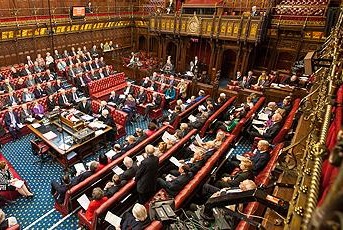Lords continue to vote to amend the Bill during ping pong with the Commons, with 12 defeats inflicted
The Nationality and Borders Bill returned to the House of Lords today for peers to consider the amendments made to it by the House of Commons during voting on March 22.
 Image credit: UK GovernmentWhile the earlier defeats of the Bill in the Lords in February and early March were rejected by MPs on March 22nd, peers decided today that the Commons still needs to think again, as the Government suffered no less that 12 defeats and only won a single, late vote.
Image credit: UK GovernmentWhile the earlier defeats of the Bill in the Lords in February and early March were rejected by MPs on March 22nd, peers decided today that the Commons still needs to think again, as the Government suffered no less that 12 defeats and only won a single, late vote.
The Refugee Council said on Twitter: "Today, the House of Lords has taken a strong stand for humanity and compassion, voting to treat refugees equally regardless of how they get here and to make a commitment to the resettlement of refugees."
The Lords today were voting on a fresh set of motions, which are available here, to amend the Nationality and Borders Bill.
The House of Lords voted by 189 to 151 for Baroness Chakrabarti's amendment that requires the Bill to be explicitly interpreted in compliance with the UK's international obligations under refugee law. The amendment inserts the following into Part 2 of the Bill: "For the avoidance of doubt, the provisions of this Part are compliant with the 1951 Convention relating to the Status of Refugees and the 1967 Protocol relating to the Status of Refugees, and must be read and given effect as such."
Conservative peer Lord Cormack was among those voting for the amendment and against the Government. Lord Cormack said in the debate: "I have not spoken really on this Bill before. I sat with increasing disappointment and sadness through the debate on Report stage and I became increasingly convinced that this, I believe, largely unnecessary Bill is narrow, mean-minded and at times approaches the vindictive. I did not vote at all on those 10 votes that we had, but I do feel moved to get up and say a few words this evening, largely because of the powerfully brief speech, and commendably brief speech, of Baroness Chakrabarti. And we have had some excellent speeches since, which really make one essential point: do you wish to be in danger of breaching international law, but also international humanity? Because that really is what it is fundamentally all about."
By 163 votes to 138, peers voted for Lord Coaker's amendment to the Bill to clarify that the new offence of arriving in the UK without official permission only applies to those doing so in breach of a deportation order.
The Lords also voted to amend the controversial offshoring proposals in the Bill, which would allow asylum seekers to be sent overseas to a third country for their claims to be processed. The Lords' amendment stipulates that offshoring can only be brought into force if the UK has agreed formal returns agreements with one or more third countries.
A further motion requiring the Government to publish the costs of offshoring before it can be brought into effect was voted for by the Lords by 176 votes to 153.
By 191 votes to 148 the Lords voted to amend the Bill so that it guarantees all refugees their full rights under the 1951 Convention and the 1967 Protocol, no matter how they arrive in the UK. The Government proposes that the Bill would allow refugees who arrive in the UK without official permission to be treated differently.
The Bill's clause 9 allowing the Secretary of State to remove a person's British citizenship without giving notice was amended and removed by the Lords by 209 votes to 165.
A motion to amend the Bill to give asylum seekers the right to work if they wait six months or more for an initial decision on their claim was voted through by the Lords with a number of Conservative rebels. The amendment passed by 199 votes to 132.
Lord Dubs' amendment to the Bill allowing unaccompanied child refugees in Europe to join their family in the UK passed by 181 votes to 144.
An amendment requiring the Home Secretary of State to publish and deliver an annual target for the resettlement of refugees to the UK was narrowly passed by peers by 159 votes to 150.
The Lords voted by 162 votes to 141 for Lord Paddick's amendment to the Bill's offence of assisting an asylum seeker to enter the UK, including by rescuing them at sea, so that it only applies to those who do so "without reasonable excuse".
Voting continued late into the night, with the House adjourning at 11.23pm.
In the last three votes of the night, the Government suffered two further defeats on amendments regarding modern slavery and human trafficking, including a defeat by just one vote, but it won the final vote of the night by 9 votes to reject Lord Coaker's amendment to the Bill for trafficking victims aged under 18.
Following the fresh amendments made by the Lords, the Nationality and Borders Bill will go back to the House of Commons.
As explained by the Institute for Government, if the House of Lords and the House of Commons do not agree on the wording of a bill, it is sent back and forth between the two Houses and they respond to each other's proposed amendments in a process known as 'ping-pong'.